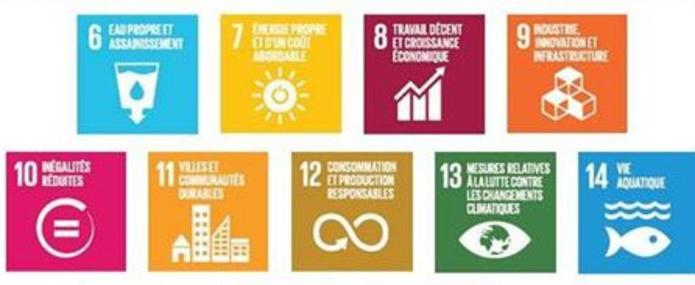The year 2017 has begun against a backdrop of tension and uncertainty. The lack of satisfactory solutions to the unprecedented increase in inequalities and in a feeling of downgrading has triggered chain reactions, in particular the temptation to turn inwards, at both the individual and the collective level, which are reflected in the election of Donald Trump in the United States and the Brexit vote. In this context, the European Union and the international community need to promote a new political vision focusing on tackling inequalities, exclusion and – because no development could be sustainable without it – the protection of our environment. This political vision also needs to prioritise cooperation between countries, because without this cooperation, the major problems of the world cannot be resolved, such as tax evasion and competition or climate change.
To achieve this, the international community, the European Union and France can build on one of the major diplomatic achievements of 2015: the Sustainable Development Goals (SDGs). Being universal and indivisible, these 17 goals and their 169 targets provide a clear definition of the kind of future we want to build collectively. They paint a picture of a more unified, sustainable world in 2030, and propose solutions for transforming our development models.
This definition has not been pulled out of a hat. Like the Paris Agreement on climate change several months later, the SDGs are the result of years of negotiations between states, with an unprecedented level of civil society involvement. These two sustainable development agreements are the only recent success stories, but are striking examples of achievements for multilateralism.
Not only the purpose of the SDGs, but also their design process, make their success imperative. This is the core task that IDDRI has set itself within the framework of its new five-year strategic plan, identifying the conditions for developing strategies and implementing sustainable development in the international and national contexts, as well as within local authorities and companies. For this first newsletter of 2017, a year after the SDGs entered into force, we provide an initial overview.
Although many countries are still in the learning process, others have already appropriated the SDGs, which are used not only as goals, but also as real tools for action.
The SDGs, their indicators and their targets are first of all an opportunity to move forward with the planning of public action, using a more comprehensive set of indicators than economic indicators alone. Several countries (Finland, Estonia, Sierra Leone) have begun to use the SDGs to this end, as described in IDDRI’s Policy Brief analysing the reports of the 22 countries that volunteered for the High-Level Political Forum (HLPF) in 2016. Others are still in the early stages, such as France, which prior to the SDGs had already set up two mechanisms for planning public action using sustainable development indicators: the Sas bill on new indicators of wealth and the national sustainable development strategy. Here, the SDGs must not simply become an additional layer of governance, but can be used to renew, harmonise and reinforce these mechanisms. At the European level, the SDGs constitute the foundations for renewing the EU narrative and, more prosaically, the Europe 2020 strategy, giving greater importance to solidarity and environmental challenges in the EU dashboard and in its action monitoring mechanisms such as the European Semester (see IDDRI’s opinion editorial). Beyond states, the SDGs can also be applied to local authorities (see IDDRI’s opinion editorial "Want sustainable urban development? It’s time for Local Agenda 2030") and to companies.
The SDGs also represent an accountability framework, which will only be effective if civil society adopts it. This is the case in some countries, such as Germany, where a coalition of NGOs has formed to monitor SDG implementation by the government, or at the EU level with the SDG Watch Europe alliance. It is not yet the case in other countries, such as France, where only the international cooperation associations have truly mobilised. However, by adopting the SDGs, the states have made certain new commitments, which are more ambitious than those set out in their legislation, concerning inequalities (see IDDRI’s opinion editorial La mesure statistique des inégalités doit servir de boussole aux gouvernements and Study "Reducing inequalities within countries: converting the global debate into action") or education, for example. This is one of the messages of IDDRI’s report on the SDGs in France.
The SDGs may also help to overcome a recurring difficulty for sustainable development: the silo mentality observed within institutions, both public and private. Meeting the challenge of food security, for example, cannot be done without integrating fair prices for farmers, the environmental impacts of production and the impacts of French and EU policies on trade partners. Once again, countries such as Norway are using the SDGs to move towards the integrated management of sustainable development (see IDDRI’s Policy Brief), and associations are utilising them to align their efforts regarding the environment, health, child protection and social protection.
Finally, applying equally to the developed, emerging and developing countries, the SDGs are a call for international cooperation. The HLPF plays a key role here: in 2016, it enabled the states to exchange on the institutional processes and frameworks for implementing the 2030 Agenda for Sustainable Development that they have launched at the domestic level; the HLPF in 2017 is expected to facilitate collective exchanges and learning on specific policies and measures. The various multilateral organisations working on particular issues – such as decent work (ILO), food (FAO), children (UNESCO), climate (UNFCCC) and biodiversity (CBD) – must also contribute to these efforts. The recent IDDRI and IASS publication on the Oceans SDG highlights the need for international cooperation in order to organise monitoring of SDG n°14.
Over and above the development of a shared project, the SDGs are therefore also tools for action that stakeholders can use to meet the challenge of a more unified, sustainable world. This is the spirit in which the team at IDDRI wishes you all the best for 2017.



